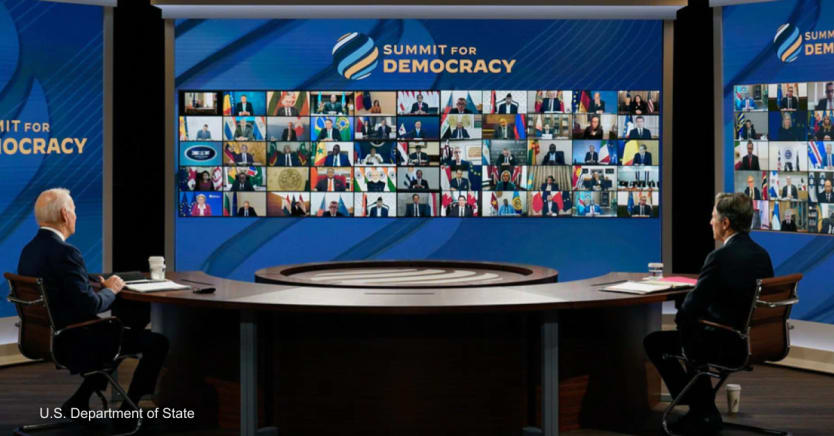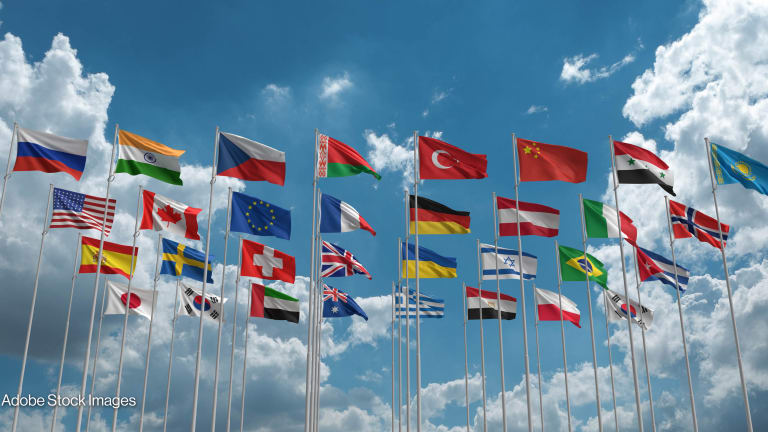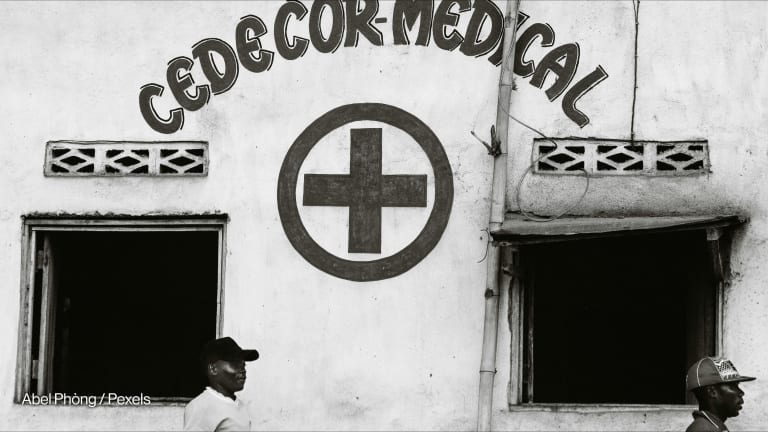
Last week, the Biden administration hosted its much anticipated Summit for Democracy, bringing together more than 100 democratic and democratic-aspiring states for a virtual two-day conference to surface “bold, practical ideas” for fighting authoritarianism and corruption, and promoting human rights.
While some good faith skeptics have questioned the efficacy of the summit and the inclusion of certain invitees with shaky democratic commitments, the enterprise stood as an important acknowledgement of the need for transnational solidarity among those devoted to the defense and expansion of global democracy.
Opinion: Corruption is a pandemic. The solution is democracy.
Significant action is needed to bring life to what are, for now, just words on a page. To clean up governance, we must clean up elections.
Given deepening solidarity among authoritarian-leaning regimes, the summit was timely. Across regions, autocratic governments share best, i.e., worst, practices while they use COVID-19 as a cover to impose new limits on civic freedoms; crib legal language to impose restrictive laws on NGOs; and put in place intrusive systems of state surveillance.
In a recent article in The Atlantic, Anne Applebaum describes the thick web of reciprocity and moral — or amoral — support that links anti-democratic leaders and their allies. These networks include state and security actors, business interests, and formal and informal media.
The summit aims to foster a countervailing dynamic of exchange and mutual assistance among democratic states and their allies, offering a platform where those interested in addressing issues of common concern can share lessons, experiences, and practices. This was reflected in an agenda that allowed for high-level discussions on topics ranging from rebuilding from COVID-19, to protecting core democratic institutions, to countering digital authoritarianism.
Supporting robust and resilient regional and transnational civic networks is critical to the fulfillment of the democracy summit’s promise.
—The spirit of transnational collaboration was also reflected in newly announced initiatives, such as an eight-nation partnership to limit the export of technologies that threaten human rights in authoritarian countries. For the summit to be successful long term, however, two things are clear.
First, the effort to strengthen global democratic networks must extend far deeper than state governments. Civil society was consulted in planning for the summit and was represented within its agenda. There were also a rich array of civil society-led side events formally and informally linked to the summit.
Civic activists, however, were not the protagonists of the gathering. Looking ahead, diverse civil society actors should be seen as equal participants to their state counterparts, especially because it is they who will hold participating governments accountable to their commitments and continue to push for democratic change in nonparticipating states.
Second, learning, exchange, and network strengthening among state and non-state actors must be approached as an ongoing process deepened over the course of years. Summits — even virtual ones — can foster new ties, but nascent connections are cemented based on dialogue and collaboration after closing remarks are delivered.
The organizers of the democracy summit seem to understand this as they launch a “year of action” in which summit participants and other critical stakeholders will focus on reinforcing and implementing commitments made during and after the summit.
In pivoting from the summit, those responsible for crafting and implementing democracy assistance should place renewed emphasis on supporting transnational exchange among regional and global civic actors. The U.S. Agency for International Development and State Department provide important support to global platforms such as the Open Government Partnership, which foster learning and collaboration among state and civic actors.
Yet most democracy assistance, including support to civil society, is bilateral in nature, which naturally treats regional or cross-border approaches as subsidiary to the project of empowering domestic civic actors. Symbolically, increased attention to regional and transnational civic network strengthening will further ground civil society assistance in the principle of mutuality that represents an explicit and implicit promise of the democracy summit.
It will practically double-down on effective peer-to-peer approaches that center Global South voices within capacity development and learning initiatives. It will promote exchange among actors experiencing common challenges, and support civic actors in tackling issues that are not limited to national borders, such as conflict, migration, and disinformation, to name a few.
By nurturing transnational civic alliances, democracy assistance programs can foster connections that strengthen regional networks and movements critical to national democratic activism. For example, multiple civil society-led, global and regional coalitions and networks have been effective in fostering domestic and international advocacy around financial corruption.
Some of these networks deliberately link civic actors, the private sector, and public institutions and have contributed to policy reform successes, including the adoption of beneficial ownership registries in multiple African countries, as well as the passage of the Corporate Transparency Act in the United States.
Democracy assistance programs can also support collaborations and bridge building that contribute to informal activist networks. The Milk Tea Alliance, which inspired and motivated digital and physical protests in Hong Kong, Thailand, and Myanmar, showcases the extent to which loose, regional social networks can foster domestic pro-democracy action.
The summit aims to foster a countervailing dynamic of exchange and mutual assistance among democratic states and their allies.
—Organic networks like the Milk Tea Alliance will never be the direct products of democracy assistance, but that assistance can seed the relationships and connections that contribute to the next emergent, contextually responsive movement.
Supporting robust and resilient regional and transnational civic networks is critical to the fulfillment of the democracy summit’s promise, and the commitments it continues to engender, including the Biden administration’s announced flagship Initiative for Democratic Renewal.
Those designing post-summit democracy assistance programs should be rigorous in theorizing and assessing the relationship between strengthened transnational civic networks and domestic governance outcomes. This means measuring the effectiveness of cross-border capacity development initiatives; tracing the spread of civic ideas; and qualitatively assessing the value of regional civic solidarity. It also means following the extent to which regional civic voices help influence ideas, and shape the agenda of any future democracy summits.










